Sistemas HVAC comerciales:cómo elegir el mejor equipo de refrigeración y calefacción para su edificio
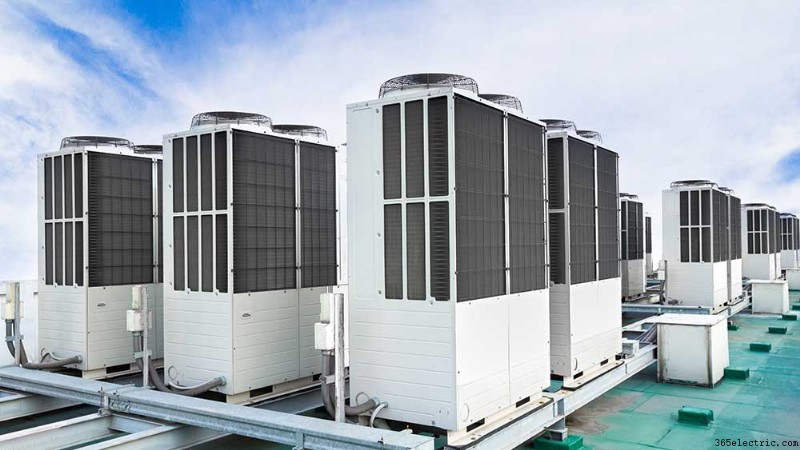
Los sistemas HVAC comerciales son un aspecto crucial de cualquier edificio. El mantenimiento de la temperatura, la humedad, la calidad del aire y mucho más depende de un sistema HVAC que funcione bien. Si falla, puede enfrentar una desafortunada pérdida de ingresos, reparaciones y clientela. Esto hace que sea extremadamente importante mantener estos sistemas en buen estado y funcionando durante todo el año.
Debido a su gran escala, los sistemas comerciales de calefacción y refrigeración pueden ser complejos y difíciles de entender. ¡Aquí hay un desglose fácil de todo lo que necesita saber para mantener los acondicionadores de aire comerciales en excelentes condiciones!
Componentes clave de los sistemas HVAC comerciales
Hay varios tipos diferentes de sistemas comerciales de calefacción y refrigeración, pero todos ellos tienen los siguientes componentes esenciales:
1. Unidad de Aire Acondicionado
Esta parte de un sistema HVAC comercial es responsable de bajar o subir la temperatura dentro de un edificio al trabajar con otros subsistemas.
2. Controlador de aire
El controlador de aire expulsa aire frío o caliente del edificio y luego lo devuelve al sistema. Tiene bobinas de evaporador que contienen refrigerante y un ventilador.
3. Compresor
Esta es una parte muy importante de un sistema HVAC. Cambia el volumen, la densidad y la temperatura del refrigerante.
4. Condensador
El condensador recibe el refrigerante del compresor y lo convierte en líquido. Esto sirve como intercambiador de calor del sistema HVAC. Cuando se enfría, expulsa el calor de su edificio y cuando se calienta, recoge el calor del exterior.
5. Válvula de expansión térmica
Esto enfría el refrigerante líquido que se va a bombear de vuelta a los serpentines.
6. Unidades Terminales
Estas unidades controlan la cantidad de aire que ingresa a cada zona a través de ductos. También tienen filtros de aire para mantener el aire libre de suciedad y residuos.
7. Termostato
Le indica a su sistema HVAC que produzca aire frío o caliente según el rango de temperatura establecido. Los edificios comerciales pueden tener varios termostatos instalados en varias habitaciones.
8. Ductos
La mayoría de las unidades comerciales con conductos tienen un sistema de conductos que ayuda a distribuir el aire acondicionado por todo el edificio.
9. Enfriadores
Estos son los elementos de enfriamiento de una gran unidad HVAC comercial. Los enfriadores eliminan el calor del líquido que corre a través de las tuberías de un edificio. Algunas unidades HVAC tienen enfriadores enfriados por aire, mientras que otras tienen enfriadores enfriados por agua.
Tipos de sistemas HVAC comerciales
Hay varias opciones para elegir un sistema comercial de calefacción y refrigeración. Cada tipo tiene sus ventajas y desventajas, por lo que es importante considerar sus necesidades específicas antes de decidir. Puede ser bastante confuso anotar todos los detalles, por lo que siempre es bueno hablar con un profesional después de reducir las opciones. Veamos todos los tipos de aire acondicionado comercial en detalle:
1. Aire acondicionado compacto
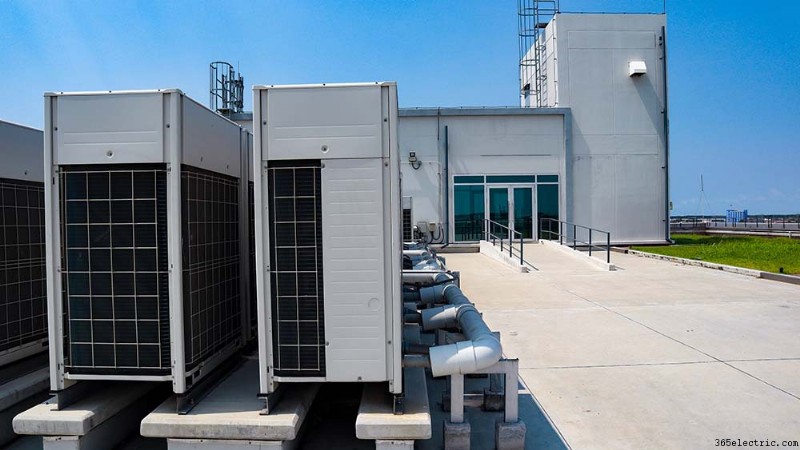
Un acondicionador de aire compacto comercial es similar a un acondicionador de aire de ventana pero mucho más grande en tamaño. Estas unidades comerciales de aire acondicionado tienen una mayor capacidad de calefacción y refrigeración que oscila entre 3 y 15 toneladas.
Los acondicionadores de aire empaquetados tienen un diseño todo en uno que contiene un condensador, un compresor, un fancoil y un evaporador. Por lo general, se montan en el exterior o en los techos de edificios como residencias para personas mayores, hospitales y condominios. El aire acondicionado se reparte por todo el edificio mediante una red de conductos ocultos en el techo.
| PROS | CONTRAS |
| Bajos costes de instalación | Vida útil limitada |
| Requisitos de mantenimiento simples | Altos costos de refrigerante |
| Funcionamiento silencioso | Alta sensibilidad a los filtros de aire bloqueados |
2. Sistema dividido
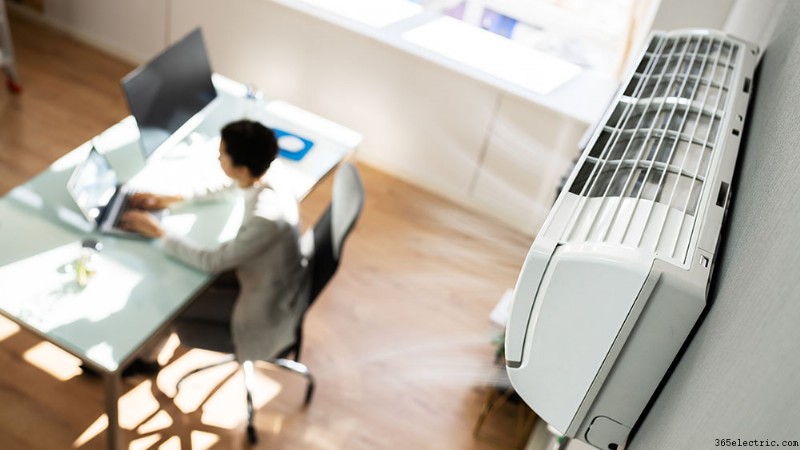
As the name suggests, a split system has two parts; an indoor and an outdoor unit. Commercial split air conditioners further have two types:
- Single-Split System
This is an affordable, energy-efficient commercial heating and cooling option for small buildings, cafes, server rooms, or shops. They are ideal for individual room cooling but can be used in combinations to condition multiple rooms. However, because each air conditioning unit needs a separate outdoor unit, this clutters the external space of the building.
| PROS | CONS |
| Ideal for small spaces | Multiple outdoor units clutter the space |
| Energy efficient | Not suitable for large buildings |
| Can be used as an additional source of air conditioning |
|
| Less expensive to install |
- Multi-Split System
In a multi-split system, one outdoor unit operates multiple inside indoor units. These systems require extensive pipework and, if not installed properly, can reduce the efficiency of your system.
Multi-split system is better suited for medium-sized buildings like restaurants or retail shops.
| PROS | CONS |
| It takes up less space | Higher installation cost |
| Preserves the building’s external appearance | Lots of pipework is needed |
| Ductwork isn’t required | Not suitable for small commercial spaces |
3. Heat Pump
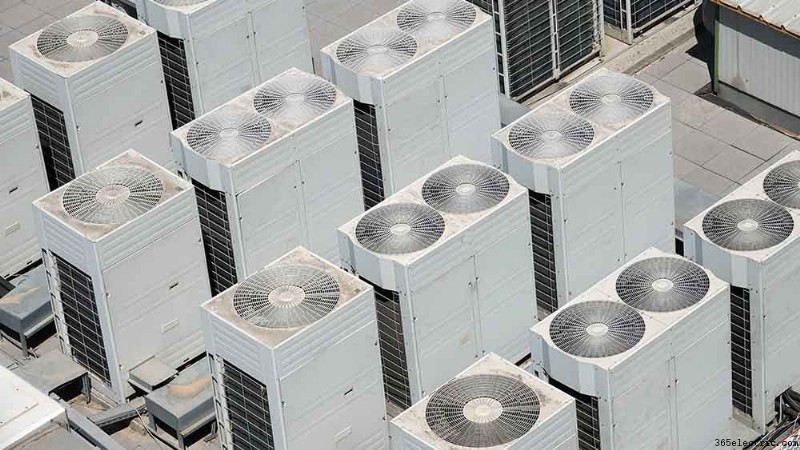
A heat pump heats or cools a building by transferring heat outside in the summers and inside in the winters. Since heat pumps do not generate heat, they can efficiently maintain comfortable temperatures. However, they’re not suitable in areas with extreme climate conditions.
Heat pumps can be ducted as well as ductless. Ducted heat pumps are suitable for larger areas but require extensive ductwork. Ductless heat pumps are ideal for supplemental or individual room cooling.
| PROS | CONS |
| Most energy efficient | Not suitable for colder climates below 40 degrees |
| Require less maintenance | Installing/cleaning ducts can be a hassle |
| Do not produce carbon monoxide | |
| Great for large and medium-sized buildings | |
| Quick installation if ductwork is installed |
4. Variable Refrigerant Flow (VRF) or Variable Refrigerant Volume (VRV)
VRF or VRV is a ductless system that uses the minimum energy to attain the required temperature. It varies the refrigerant volume to match the precise requirements of a building. If the system requires more cooling, more refrigerant will enter the pipes. Because of varied compressor speed and no duct involvement, these units are considered much more efficient than the traditional HVAC units. Its mechanism results in lower energy costs and the long-term sustainability of the unit.
| PROS | CONS | |
| Saves energy bills | Expensive equipment | |
| Suitable for spaces with variable cooling or heating requirements | Takes a lot of space | |
| Better humidity and temperature control | Backup condenser is required in case of a malfunction |
Make Any Commercial Cooling &Heating Equipment Smart
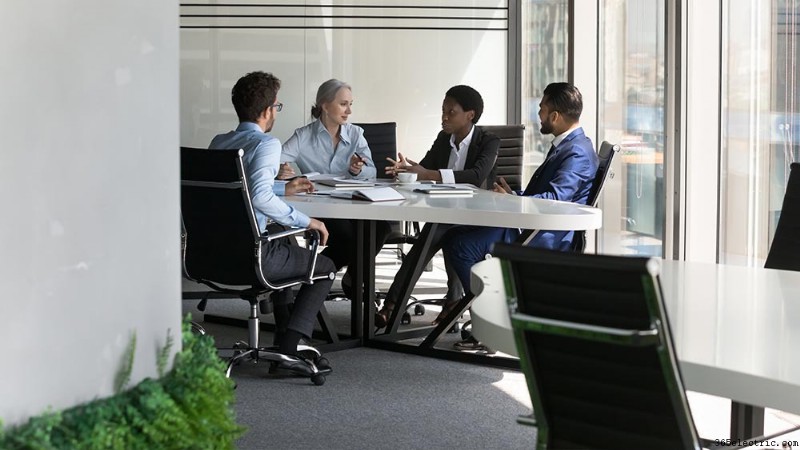
Maintaining a consistent temperature throughout your building while considering the different needs of the inhabitants can be quite challenging and time-consuming. But not if you pair your commercial HVAC system with a smart thermostat (for ducted) or a smart AC controller (for ductless).
These smart devices allow you to automate your building’s climate. You can set schedules and have different settings for different days of the week. Moreover, you can create zones and set customizable temperature regions within the building.
With all the next-gen features like temperature/humidity-based triggers, geofencing, usage history, and much more, you can save up to 25% on energy bills.
How to Choose a Suitable Commercial HVAC System?
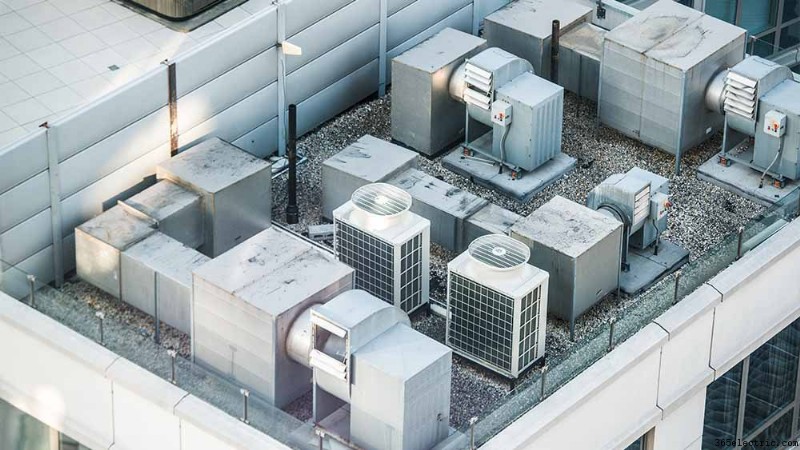
When it comes to choosing an air conditioning unit for commercial use, the following factors are important to consider:
- Building design
- Energy efficiency
- Climate conditions
- Air quality
The first step is to determine the heating and cooling requirements of the space. This will vary depending on the type of business and the number of people that occupy the building.
Next, consider the building’s energy efficiency. In general, newer buildings are better insulated and require less energy to heat and cool. However, older buildings can often be retrofitted with energy-efficient windows, doors, and insulation.
Climate conditions are also an important consideration. For example, mini-splits won’t work when heat waves hit if the building is in an extremely hot and humid climate.
Finally, air quality is another important factor to consider. Indoor air quality can be affected by a number of factors, including off-gassing from building materials, cleaning products, and office equipment. To ensure proper airflow and filtration, it’s important to choose an HVAC system that is sized appropriately for the space and ventilation needs.
Haz que tu aire acondicionado sea inteligente
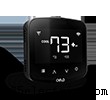
Cielo Breez Plus
El mejor controlador de CA inteligente de su clase con controles locales
Comprar ahora$114$149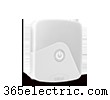
Cielo Breez Eco
Controlador de CA inteligente mejor valorado en blanco
Comprar ahora$73$99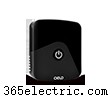
Cielo Breez Eco
Controlador de CA inteligente mejor valorado en negro
Agotado$68$99Is Commercial Building HVAC System Maintenance Worth the Expense?
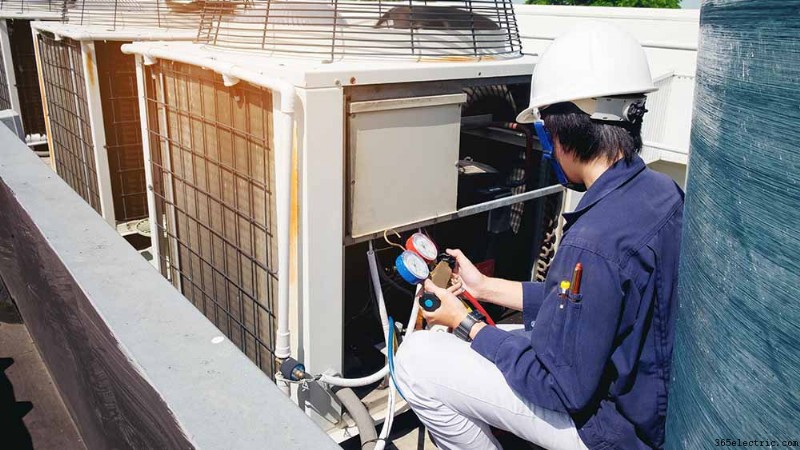
A typical commercial building HVAC system is a complex network of air conditioning components, including air ducts, air filters, coils, and blowers. To keep this system running smoothly, it is important to perform regular maintenance.
Usually, commercial HVAC maintenance may be too costly, but it saves a lot in the long run. For example, regular maintenance can extend the durability of your equipment. Additionally, properly maintained HVAC systems tend to have lower operating costs, so you’ll save money on your energy bills each month. Finally, regular maintenance can help ensure the comfort of your tenants or customers by keeping the temperature and humidity always at a comfortable level. When you weigh all the factors, it’s clear that investing in maintenance for your commercial HVAC system is a thrifty decision.
Here are the most important things to tick off your regular HVAC maintenance list:
- Inspect air filters and clean or replace them as needed
- Clean the condenser and evaporator lines
- Check for blockages in the air ducts
- Inspect the drain lines to ensure they’re not clogged
- Test the thermostat readings to make sure it’s accurate
Additionally, follow these detailed commercial HVAC maintenance tips to ensure your system runs smoothly and efficiently throughout the year.
How Do Commercial Air Conditioners Differ From Residential Systems?
When it comes to climate control, commercial HVAC systems are in a class of their own. These heavy-duty systems are designed to cool or heat large spaces quickly and efficiently.
Here’s a closer look at some of the key ways that commercial units differ from residential HVAC systems.
| Commercial HVAC System | Residential HVAC System | |
| Size | Larger | Smaller |
| Operating Power | More powerful | Less powerful |
| Placement | Roofs or utility rooms | Inside homes |
| Cost | Less expensive | More expensive |
| Maintenance | Requires less maintenance | High maintenance |
| Drainage | Complex | Simple |
Commercial HVAC systems are a vital part of any business, and it’s important to understand the different types and how they work before making a purchase. By considering factors such as size, usage, and climate, you can choose the best system for your needs and ensure that your employees or customers stay comfortable all year long. Maintenance is important for any commercial air conditioner, but the cost-benefit analysis can be tricky. However, carrying out regular AC tune-ups can save you money in the long run.
- ·Los mejores sistemas de reproducción de iPod
- ·Los mejores sistemas de sonido para Home
- ·Impresoras fotográficas:elegir la mejor para sus necesidades
- ·Cómo elegir los mejores subwoofers para su automóvil
- ·Comprenda la 'H para calefacción en HVAC'
- ·¿Cuál es el mejor sistema de ventilación de aire fresco para su hogar?
- ·Los 5 mejores consejos para mantener su sistema HVAC
- ·Prepararse para el invierno:por qué su HVAC no puede soportar el frío
- Elegir el mejor flash Speedlite de Canon para sus necesidades
- ¿Cómo elegir el mejor filtro de aire para su HVAC?
- ¿Cuál es el mejor filtro de aire para su hogar?
- Tu guía básica para elegir el mejor sistema de calefacción para el hogar
- Diferentes tipos de acondicionadores de aire:elegir el mejor aire acondicionado para su hogar
- Una guía completa para mejorar su HVAC para una mejor calidad del aire interior
